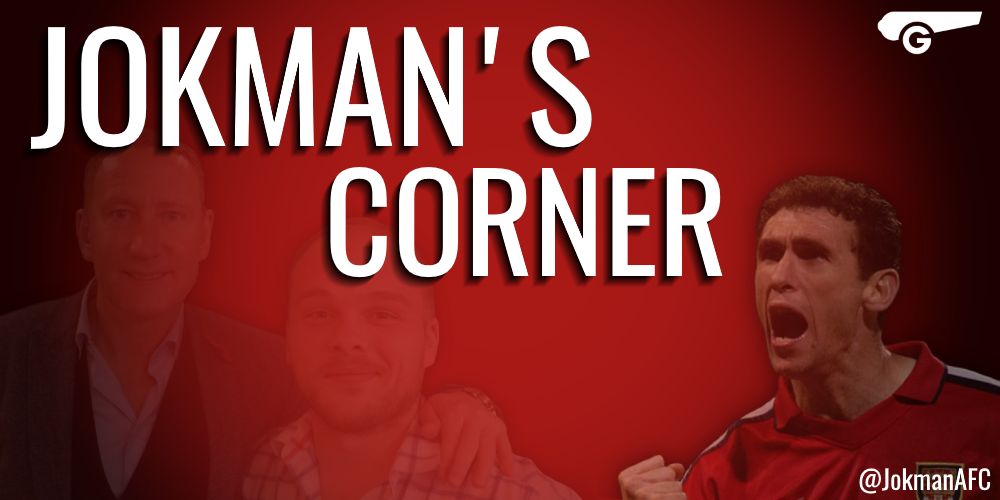New Social Media Rules For Arsenal

Mertesacker leaned his shoulder into his marker and shifted his weight. The corner was ready to be whizzed in, and a goal here in the 93rd minute would surely mean the winner.
The away crowd bubbled in anticipation. The whole game had been nip and tuck but they had been buoyed by the effort their team had put in. Snapping into tackles, running at their opponents. It had only been a combination of the goalkeeper and the woodwork that had stopped them breaking the deadlock.
The fans and the players knew they had deserved all three points. Still, this was Arsenal - when had that ever been a factor in a result?
This match could be different though. A win here would be huge, a real game-changer.
Mesut Ozil looked into the box, and delivered the ball. It arced toward the back post, and Per started to move.
The German’s weight pushed into his marker and it gave him the half yard he needed to jump cleanly. His marker would now be milliseconds behind him.
The ball sailed over the goalkeeper’s grasping hands and Mertesacker knew he was in the right place. His leap was above his attempted captor, and his forehead met the ball in the sweet spot. The ball smacked against his head and careered toward the goal. The goalkeeper trying to get the ball at the first attempt meant he couldn’t stop the ball hitting the back of the net.
It was the winner.
This win proved many people wrong. So many writers, pundits, former players - no-one gave them a hope in hell of winning this game. The build-up to the game was filled with talk of how many the opponent would get, the atrocious away record of Arsenal going to top teams.
This was one of those sweet moments that fans dream of.
Social media fizzed with activity. Memes from social media teams and joyous fans flashed up furiously as they all revelled in upsetting the odds.
One of the journalists was particularly biased in his pre-match assessment. He had picked a combined XI from the two teams, and included precisely zero from the Gunners. It would have attracted a lot of attention if it wasn’t typical fare that Arsenal fans had to deal with.
It attracted a fair amount of attention after the result though.
Arsenal’s social media team were quite prolific in the use of their Twitter and Facebook accounts. They posted regular, interesting content and they obviously saw a chance - and they took it.
They posted a reply to this journalist’s pessimistic view of Arsenal’s chances with an image designed to simply capture Arsenal’s joy and give an emphatic reply to the doubters.
It was a dog with a grumpy face, in an Arsenal scarf.
Everyone loves a dog image on social media, so it proved, as the retweets and comments went through the roof.
The journalist, quite obviously suffering from an upset stomach after eating too much humble pie, took to Twitter to rally support from his fellow writers. They began a campaign to lambast Arsenal’s social media arm for what was a blatant and uncalled for attack.
The writer complained of death threats and horrible comments after Arsenal’s dog-themed reply. Obviously, a sarcastic reply from the club would prompt such bile. How could the club even think to reply, knowing this would be the result?
The response the next day was quite something.
The FA got involved on the request of the journalists, who claimed this response was uncalled for and they should be able to write anything without being subjected to a reply. The FA agreed that this needed to be stamped out, and quickly put into place a set of guidelines that each club had to adhere to.
This meant that writers could cobble together articles that had freedom to say literally anything, and clubs needed to follow rules when replying to the writer's products.
The next match saw a newspaper run with a story that Arsenal have been in the shadow of Tottenham since 1961. Arsenal, following the strict procedural rules, replied with a massive thumbs up and a smiling unicorn.
This rule stayed in place, but no other club were subject to the level of attention that Arsenal were. Fans were apoplectic, and directed their furore toward the authors of such defamatory pieces. This led to the FA working alongside social media to stop any direct replies to the writers.
The end game was that writers were given free reign, and got exactly what they wanted, without fear of reprisal.
Fin.
Tell us what you think! If you agree, or have a different view, please leave a comment in the comments section or why not write a response or your own article on YouWrite?Think you know Arsenal? Test your Arsenal knowledge on our trivia page and see if you can beat the top score.
Don't forget to like us on Facebook, add us to your G+ circle and follow us on Twitter.
Follow us Follow our podcast


